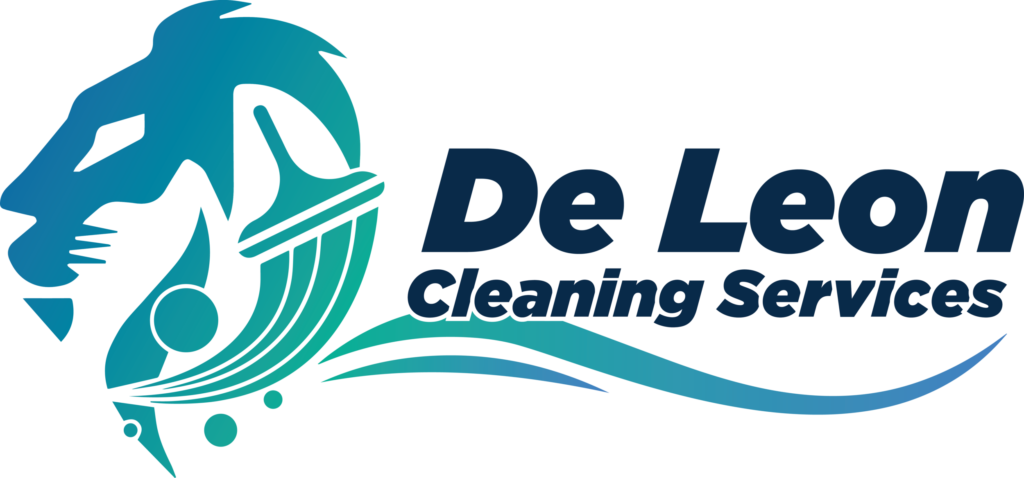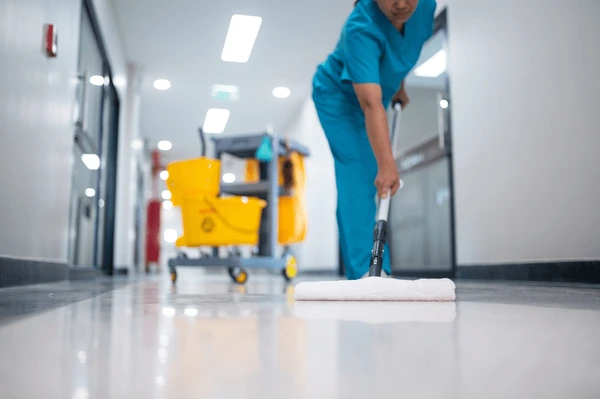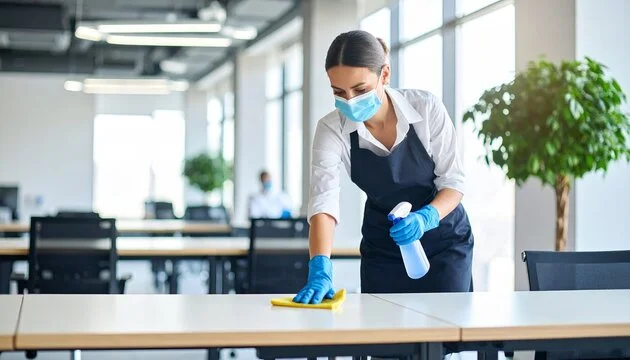
The Importance of Cleaning the Workplace Frequently: Health & Productivity Benefits
Maintaining a clean and organized workplace is far more than just a matter of appearances. Frequent cleaning has a direct impact on employee health, boosts productivity, and fosters a positive company culture. In today’s fast-paced business environment, where employee well-being and productivity are top priorities, workplace cleanliness has become a crucial factor in achieving success.
We’ll explore the health benefits of frequent cleaning, the impact on employee productivity, and how professional cleaning services can transform your work environment.
Why Workplace Cleanliness Matters More Than Ever: The direct connection between cleanliness and employee well-being
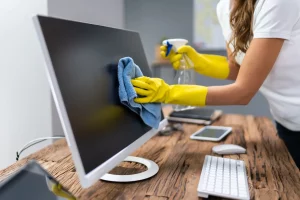 A clean workplace is far more than just something pleasant to look at — it is a fundamental part of maintaining a healthy and productive business environment. When employees arrive each day at a tidy and organized office, they immediately feel more comfortable and secure, knowing that their employer values their well-being. Cleanliness goes beyond aesthetics; it directly influences health outcomes. Dust, bacteria, mold spores, and allergens can quickly build up in shared spaces such as desks, meeting rooms, break areas, and restrooms. If these contaminants are not addressed regularly, they can lead to a wide range of health issues, from minor allergic reactions to more serious respiratory conditions and recurring infections.
A clean workplace is far more than just something pleasant to look at — it is a fundamental part of maintaining a healthy and productive business environment. When employees arrive each day at a tidy and organized office, they immediately feel more comfortable and secure, knowing that their employer values their well-being. Cleanliness goes beyond aesthetics; it directly influences health outcomes. Dust, bacteria, mold spores, and allergens can quickly build up in shared spaces such as desks, meeting rooms, break areas, and restrooms. If these contaminants are not addressed regularly, they can lead to a wide range of health issues, from minor allergic reactions to more serious respiratory conditions and recurring infections.
In addition, germs spread easily in high-traffic areas where employees share equipment like keyboards, telephones, and printers. Without proper cleaning, a simple cold can rapidly turn into an office-wide problem, increasing absenteeism and lowering overall productivity. On the other hand, a proactive cleaning routine significantly reduces the spread of illnesses, keeps indoor air quality at healthy levels, and creates a safer atmosphere for everyone. A clean workplace is therefore not a luxury, but a necessity for protecting employees, promoting efficiency, and projecting professionalism to clients and visitors alike.
First impressions: how cleanliness impacts clients and visitors
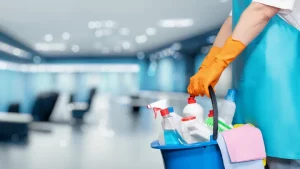
Beyond employee well-being, a clean and organized office is also a powerful reflection of your company’s professionalism and values. The moment clients, business partners, or visitors walk through the door, they begin forming an impression about your organization. A workspace that is tidy, fresh, and well-maintained communicates that the company is reliable, detail-oriented, and committed to high standards. This level of care builds trust, enhances credibility, and can even influence purchasing decisions, since people naturally feel more comfortable doing business with companies that project order and responsibility.
On the other hand, a cluttered or dirty workplace quickly sends the wrong message. Disorganized desks, dusty surfaces, or unpleasant odors may cause visitors to doubt the efficiency and seriousness of the business. In some cases, it can even damage long-term relationships, as clients may associate a lack of cleanliness with a lack of professionalism. Keeping an office clean is therefore not just about hygiene — it is a strategic tool for strengthening your company’s reputation.
Health Benefits of a Clean Workplace: Reducing the spread of germs and infections
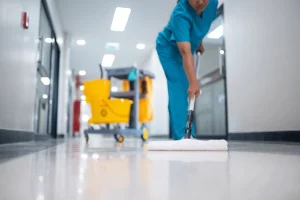
Workplaces are natural hotspots for germs and bacteria because of the high number of people who share the same environment daily. Items that are touched frequently—such as doorknobs, keyboards, light switches, and communal kitchen appliances—become breeding grounds for viruses like the flu, the common cold, and even more serious infections. Without consistent cleaning, these pathogens can spread rapidly, causing multiple employees to fall ill within a short time. The result is higher absenteeism, lower morale, and a direct impact on overall productivity.
Regular cleaning and disinfecting routines are one of the most effective ways to break this chain of transmission. By sanitizing shared surfaces and implementing preventive measures, businesses can drastically reduce the risk of contagious outbreaks. A healthier workforce means fewer sick days, smoother operations, and greater confidence among employees that their well-being is valued. In today’s environment, prioritizing hygiene is not only about compliance—it is about creating a safer, more resilient workplace.
Improving indoor air quality and reducing allergens
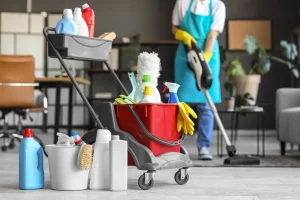
Indoor air quality is one of the most overlooked aspects of workplace health, yet it plays a vital role in how employees feel and perform each day. Dust, mold, pollen, and other microscopic pollutants can easily accumulate on surfaces, in carpets, and within air ducts. When combined with poor ventilation or irregular cleaning practices, these allergens spread quickly throughout the office. The result can be frequent complaints of headaches, fatigue, eye irritation, and even more serious respiratory issues such as asthma or allergic reactions. Over time, this not only impacts employee well-being but also decreases productivity and overall job satisfaction.
Implementing consistent cleaning routines is one of the most effective ways to improve indoor air quality. Tasks such as vacuuming with HEPA filters, disinfecting surfaces, and maintaining HVAC systems ensure that allergens and airborne particles are kept to a minimum. Companies that prioritize clean air create a healthier and more comfortable environment where employees can concentrate, collaborate, and perform at their best without being hindered by preventable health problems. A workplace that breathes clean air is ultimately a workplace that thrives.
Supporting mental health through clutter-free environments
Mental health in the workplace is influenced not only by workload and culture but also by the physical environment where employees spend most of their day. A cluttered, messy office can create feelings of stress, anxiety, and even frustration, as the brain naturally reacts negatively to disorganization. When employees are surrounded by piles of papers, scattered equipment, or untidy common areas, their ability to concentrate and stay motivated decreases significantly. Over time, this can contribute to lower morale, reduced creativity, and even burnout.
On the other hand, a clean and organized workspace fosters calmness, focus, and a sense of control. Simple practices such as maintaining clutter-free desks, keeping files organized, and ensuring communal spaces remain tidy can have a positive effect on overall well-being. Professional cleaning services further enhance this environment by ensuring a consistent level of cleanliness that employees can depend on. By promoting mental health through an orderly workspace, companies not only improve employee happiness but also strengthen collaboration, innovation, and long-term retention. In short, a clutter-free environment is a direct investment in both mental wellness and workplace productivity.
Productivity Advantages of a Clean Workspace: Fewer sick days and improved attendance
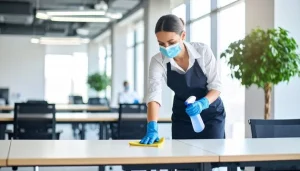
One of the clearest productivity advantages of maintaining a clean workspace is the direct reduction in sick days. Offices, especially those with many shared surfaces and equipment, can easily become breeding grounds for bacteria and viruses. When cleaning and disinfecting are neglected, germs spread quickly, leading to recurring colds, flu outbreaks, and other illnesses that force employees to take time off. Each absence interrupts workflows, delays projects, and increases pressure on the rest of the team. Over time, this cycle negatively impacts overall business performance.
By contrast, a consistent cleaning routine that prioritizes sanitation significantly reduces the spread of contagious diseases. Employees remain healthier, attendance improves, and projects move forward without constant disruption. This not only stabilizes productivity but also creates a sense of reliability within the team, as managers and staff can trust that fewer health-related interruptions will occur. Furthermore, employees who feel their health is protected are more likely to remain engaged, loyal, and motivated. In this way, workplace cleanliness becomes an essential strategy for sustaining consistent operations and long-term productivity.
Enhanced focus, creativity, and concentration
A clean and organized workspace does more than just look professional; it directly supports enhanced focus, creativity, and overall concentration among employees. Cluttered environments are filled with distractions — stacks of papers, messy desks, or disorganized common areas constantly compete for attention. This visual noise makes it harder for employees to process information efficiently and often leads to wasted time searching for documents or tools. Over the long term, these small distractions add up, reducing overall productivity and increasing stress levels.
When a workplace is well-maintained and free from unnecessary clutter, employees experience a calmer environment that allows them to dedicate their full attention to their tasks. A tidy space helps the brain filter information more effectively, which not only improves concentration but also stimulates creativity and problem-solving. Professional cleaning routines reinforce this environment by ensuring consistent order and cleanliness. By removing distractions and creating an atmosphere of clarity, companies enable their employees to think more freely, innovate, and perform at their best. In short, a clean workspace is a catalyst for creativity and sharp focus.
Boosting employee morale and engagement
A clean workplace does more than protect physical health — it also plays a vital role in boosting employee morale and long-term engagement. When employees walk into a well-maintained office each day, they feel valued and respected by their employer. Cleanliness sends a clear message: the company cares about their comfort and well-being. This sense of being appreciated increases job satisfaction and motivates employees to give their best effort. Over time, a positive environment helps strengthen loyalty, reduce turnover, and build a more committed team.
On the other hand, neglecting workplace cleanliness can have the opposite effect. Employees who are forced to work in messy or unsanitary conditions may feel undervalued, which gradually decreases motivation and engagement. Professional cleaning services ensure that the office remains consistently pleasant, reinforcing a culture of respect and care. Ultimately, a clean environment contributes to higher morale, stronger collaboration, and greater enthusiasm for daily tasks — all of which directly support productivity and business success.
Workplace Safety and Risk Reduction: Preventing slips, trips, and falls
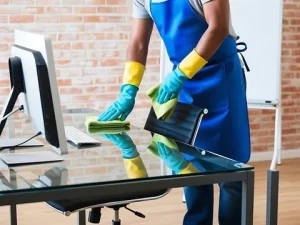
Workplace safety is one of the most important reasons to maintain a consistent cleaning routine, and one of the biggest risks in any office or facility is slips, trips, and falls. These accidents may seem minor, but they are among the leading causes of workplace injuries and can result in serious consequences such as lost workdays, medical expenses, and even legal liability for the company. Cluttered walkways, spills left unattended, loose cables, or poorly maintained floors all create hazards that increase the likelihood of accidents.
Regular cleaning and maintenance play a crucial role in preventing these risks. By promptly addressing spills, ensuring floors are free of debris, and keeping pathways clear, companies can significantly reduce the chances of slips and falls. Properly organized cables and routine inspections of high-traffic areas also enhance safety. A clean environment is not just about aesthetics; it is a proactive approach to risk management that protects employees, visitors, and the company’s reputation. In the long run, investing in cleanliness is investing in safety, productivity, and peace of mind.
Maintaining equipment and extending its lifespan
Cleanliness in the workplace not only protects employees but also plays a critical role in preserving office equipment and extending its lifespan. Dust, dirt, and grime may appear harmless at first, but when they accumulate on computers, printers, HVAC systems, and other machinery, they can cause serious damage over time. Dust particles clog ventilation systems, leading to overheating, while dirt buildup in delicate components can reduce efficiency and increase the likelihood of breakdowns. These issues result in higher maintenance costs, unexpected downtime, and the need for premature replacements.
By implementing consistent cleaning routines, companies can protect their investments in technology and infrastructure. Regular dusting, sanitizing, and scheduled deep cleaning of workstations and equipment areas ensure that devices run smoothly and last longer. Professional cleaning services are particularly valuable because they use proper techniques and products that prevent damage while keeping equipment in optimal condition. In the long term, maintaining cleanliness reduces operational expenses, improves reliability, and ensures that employees have the tools they need to perform effectively every day.
Environmental Benefits of Regular Cleaning: Eco-friendly cleaning products and sustainability
Modern businesses are increasingly aware of the importance of sustainability, and one of the simplest ways to support environmental responsibility is by using eco-friendly cleaning products in the workplace. Traditional cleaning supplies often contain harsh chemicals that not only pose health risks to employees but also contribute to pollution when disposed of improperly. Over time, these chemicals can harm indoor air quality, irritate skin, and even cause respiratory issues. In contrast, eco-friendly cleaning solutions are formulated with biodegradable ingredients that are safer for people and the planet.
By switching to green cleaning practices, companies can reduce their environmental footprint while still maintaining high standards of cleanliness. Products certified as non-toxic and environmentally safe minimize harmful residues on surfaces and in the air, creating a healthier workplace for employees. Beyond the immediate benefits, this commitment to sustainability also strengthens a company’s brand image, showing clients and employees alike that the business values both health and the environment. Investing in eco-friendly cleaning is not only a responsible choice but also a long-term strategy that aligns workplace hygiene with global sustainability goals.
Reducing workplace waste through organized spaces
A clean and organized workplace does more than improve appearance — it also plays an essential role in reducing waste and encouraging more sustainable habits among employees. Cluttered spaces often lead to unnecessary duplication of materials, lost supplies, and poor recycling practices. For example, when storage areas or desks are disorganized, employees may order extra office supplies they do not actually need, creating avoidable expenses and additional waste. Similarly, unmarked bins or messy common areas can discourage proper recycling, leading to valuable materials ending up in the trash.
By keeping the workplace organized, businesses make it easier for employees to identify, use, and recycle resources effectively. Clear workstations, labeled containers, and tidy storage areas support waste reduction and foster eco-friendly habits daily. Professional cleaning and organization services can further streamline these processes, ensuring that systems for waste separation and recycling are consistently maintained. An orderly office not only reduces clutter but also contributes to environmental sustainability, operational efficiency, and cost savings — benefits that extend far beyond cleanliness itself.
The Role of Professional Cleaning Services: Why outsourcing cleaning saves time and money
Outsourcing cleaning services has become a practical and cost-effective solution for many businesses seeking to maintain a consistently hygienic workplace. Relying solely on in-house staff often leads to irregular cleaning schedules, lack of specialized training, and higher expenses for equipment and supplies. Professional cleaning companies, on the other hand, bring expertise, efficiency, and industry-standard tools that guarantee a higher level of cleanliness. This ensures that every area of the office — from common spaces to high-touch surfaces — is cleaned thoroughly and on a consistent basis.
From a financial perspective, outsourcing saves money in the long run. Instead of investing in costly cleaning equipment, maintenance, and full-time salaries, businesses can choose flexible cleaning packages tailored to their needs. This eliminates unnecessary overhead while ensuring predictable, manageable costs. In addition, healthier and cleaner workplaces reduce absenteeism, boost employee morale, and prevent expensive repairs caused by neglected maintenance. By outsourcing cleaning, companies gain both time and savings, allowing their teams to focus on core business activities without compromising workplace hygiene.
Tailored cleaning solutions for offices and industries
Professional cleaning companies like De Leon Cleaning Services offer customized plans. From daily office cleaning to deep sanitation, businesses can choose services that fit their
unique needs.
Every workplace has unique cleaning needs, and a one-size-fits-all approach rarely delivers the best results. Tailored cleaning solutions allow businesses to receive services specifically designed to match their industry, office layout, and daily operations. For example, a corporate office may require daily surface sanitization, restroom maintenance, and scheduled carpet cleaning, while a manufacturing facility might need specialized floor care, equipment cleaning, and strict safety compliance. Healthcare environments, on the other hand, demand even stricter protocols with hospital-grade disinfectants to protect both staff and patients.
Professional cleaning companies assess the specific requirements of each workplace and create customized plans that maximize efficiency and effectiveness. This flexibility ensures that businesses pay only for the services they truly need, avoiding unnecessary costs while guaranteeing a consistently clean environment. Tailored solutions also adapt as companies grow or as health and safety standards evolve, providing long-term value and peace of mind. By choosing customized cleaning strategies, businesses can maintain a professional image, protect employee health, and ensure that their facilities meet industry-specific standards at all times.
Creating a Culture of Cleanliness Among Employees: Encouraging daily tidying habits
Encouraging daily tidying habits among employees is one of the most effective ways to sustain a clean and organized workplace between professional cleaning sessions. Simple actions such as wiping down desks at the end of the day, properly storing documents, washing personal mugs, and disposing of trash immediately can make a significant difference in maintaining a healthy environment. These small routines help prevent clutter from building up and reduce the spread of germs in high-traffic areas like break rooms or meeting spaces.
When companies actively promote these habits, they also foster a sense of shared responsibility. Employees begin to view cleanliness as part of their daily workflow rather than an occasional task left only to cleaning staff. Management can support this culture by providing sanitizing wipes, accessible trash bins, and clear policies that encourage employees to keep their work areas organized. Over time, these practices improve overall morale, strengthen teamwork, and create an environment where everyone feels accountable for maintaining a professional space. A workplace where tidying is part of the culture will always project a cleaner, healthier, and more productive atmosphere.
Shared responsibility and workplace policies
Maintaining a consistently clean workplace is most effective when it is treated as a shared responsibility rather than a task left only to professional cleaners. While cleaning services provide the foundation for hygiene and order, employees play a critical role in sustaining these standards throughout the day. Clear workplace policies that define cleanliness expectations help create accountability and ensure that everyone contributes to maintaining a professional environment. For example, guidelines can include keeping desks organized, properly disposing of waste, promptly cleaning up spills, and respecting shared areas such as kitchens, meeting rooms, and restrooms.
When these policies are well communicated and reinforced by management, they encourage employees to view cleanliness as part of their daily responsibilities. Training sessions, reminders, and visible signage can further strengthen compliance and create a culture where hygiene is valued. This shared commitment not only reduces health risks and operational disruptions but also fosters teamwork, respect, and pride in the workplace. Ultimately, combining professional cleaning with clear policies and employee participation creates a sustainable strategy that keeps the workplace safe, organized, and welcoming.
FAQs About Workplace Cleaning
1. How often should a workplace be cleaned?
For best results, offices should be cleaned daily, with deep cleaning scheduled weekly or monthly, depending on usage.
2. Does frequent cleaning improve employee health?
Yes. Regular cleaning reduces allergens, germs, and bacteria that cause sickness and fatigue.
3. Is professional cleaning better than in-house cleaning?
Professional cleaning ensures a higher standard, specialized equipment, and consistency that in-house staff often cannot maintain.
4. What areas of an office need the most attention?
High-touch surfaces like doorknobs, keyboards, shared phones, restrooms, and kitchens are critical cleaning zones.
5. Can eco-friendly cleaning still disinfect effectively?
Yes. Green cleaning products today are just as effective as traditional ones, without harmful chemical residues.
6. How can employees contribute to workplace cleanliness?
By keeping personal areas tidy, sanitizing desks, and respecting shared spaces, employees play an important role in maintaining cleanliness.
Conclusion: A Cleaner Workplace for a Healthier, Happier Team
A frequently cleaned workplace is more than just a pleasant environment — it is a foundation for employee health, safety, productivity, and company success. Investing in regular cleaning, especially through professional services like De Leon Cleaning Services, pays off with healthier employees, fewer sick days, stronger client impressions, and a positive work culture.
A clean workplace is much more than an aesthetic choice — it is a cornerstone of employee health, productivity, and overall business success. Companies that prioritize cleanliness send a strong message to both employees and clients: health, safety, and professionalism are top priorities. Regular cleaning reduces the spread of germs, improves indoor air quality, and minimizes allergens, directly contributing to fewer sick days and higher workplace satisfaction. At the same time, an organized environment supports mental well-being, boosts focus, and helps employees feel valued and motivated.
Beyond health and productivity, workplace cleanliness enhances safety by preventing accidents, protects equipment from premature damage, and supports sustainability through eco-friendly practices and waste reduction. For many businesses, partnering with professional cleaning services is the most effective way to guarantee consistent hygiene standards while saving time and resources. Ultimately, investing in a clean workspace is investing in people. When employees feel safe, energized, and respected, they perform better, collaborate more effectively, and contribute to long-term growth. A cleaner workplace truly creates a healthier, happier, and more successful team.
